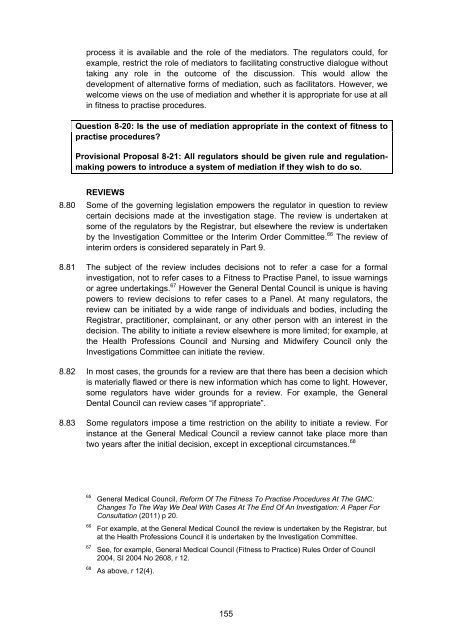Regulation of Health and Social Care Professionals Consultation
Regulation of Health and Social Care Professionals Consultation
Regulation of Health and Social Care Professionals Consultation
You also want an ePaper? Increase the reach of your titles
YUMPU automatically turns print PDFs into web optimized ePapers that Google loves.
process it is available <strong>and</strong> the role <strong>of</strong> the mediators. The regulators could, for<br />
example, restrict the role <strong>of</strong> mediators to facilitating constructive dialogue without<br />
taking any role in the outcome <strong>of</strong> the discussion. This would allow the<br />
development <strong>of</strong> alternative forms <strong>of</strong> mediation, such as facilitators. However, we<br />
welcome views on the use <strong>of</strong> mediation <strong>and</strong> whether it is appropriate for use at all<br />
in fitness to practise procedures.<br />
Question 8-20: Is the use <strong>of</strong> mediation appropriate in the context <strong>of</strong> fitness to<br />
practise procedures?<br />
Provisional Proposal 8-21: All regulators should be given rule <strong>and</strong> regulationmaking<br />
powers to introduce a system <strong>of</strong> mediation if they wish to do so.<br />
REVIEWS<br />
8.80 Some <strong>of</strong> the governing legislation empowers the regulator in question to review<br />
certain decisions made at the investigation stage. The review is undertaken at<br />
some <strong>of</strong> the regulators by the Registrar, but elsewhere the review is undertaken<br />
by the Investigation Committee or the Interim Order Committee. 66 The review <strong>of</strong><br />
interim orders is considered separately in Part 9.<br />
8.81 The subject <strong>of</strong> the review includes decisions not to refer a case for a formal<br />
investigation, not to refer cases to a Fitness to Practise Panel, to issue warnings<br />
or agree undertakings. 67 However the General Dental Council is unique is having<br />
powers to review decisions to refer cases to a Panel. At many regulators, the<br />
review can be initiated by a wide range <strong>of</strong> individuals <strong>and</strong> bodies, including the<br />
Registrar, practitioner, complainant, or any other person with an interest in the<br />
decision. The ability to initiate a review elsewhere is more limited; for example, at<br />
the <strong>Health</strong> Pr<strong>of</strong>essions Council <strong>and</strong> Nursing <strong>and</strong> Midwifery Council only the<br />
Investigations Committee can initiate the review.<br />
8.82 In most cases, the grounds for a review are that there has been a decision which<br />
is materially flawed or there is new information which has come to light. However,<br />
some regulators have wider grounds for a review. For example, the General<br />
Dental Council can review cases “if appropriate”.<br />
8.83 Some regulators impose a time restriction on the ability to initiate a review. For<br />
instance at the General Medical Council a review cannot take place more than<br />
two years after the initial decision, except in exceptional circumstances. 68<br />
65 General Medical Council, Reform Of The Fitness To Practise Procedures At The GMC:<br />
Changes To The Way We Deal With Cases At The End Of An Investigation: A Paper For<br />
<strong>Consultation</strong> (2011) p 20.<br />
66 For example, at the General Medical Council the review is undertaken by the Registrar, but<br />
at the <strong>Health</strong> Pr<strong>of</strong>essions Council it is undertaken by the Investigation Committee.<br />
67<br />
See, for example, General Medical Council (Fitness to Practice) Rules Order <strong>of</strong> Council<br />
2004, SI 2004 No 2608, r 12.<br />
68 As above, r 12(4).<br />
155
















